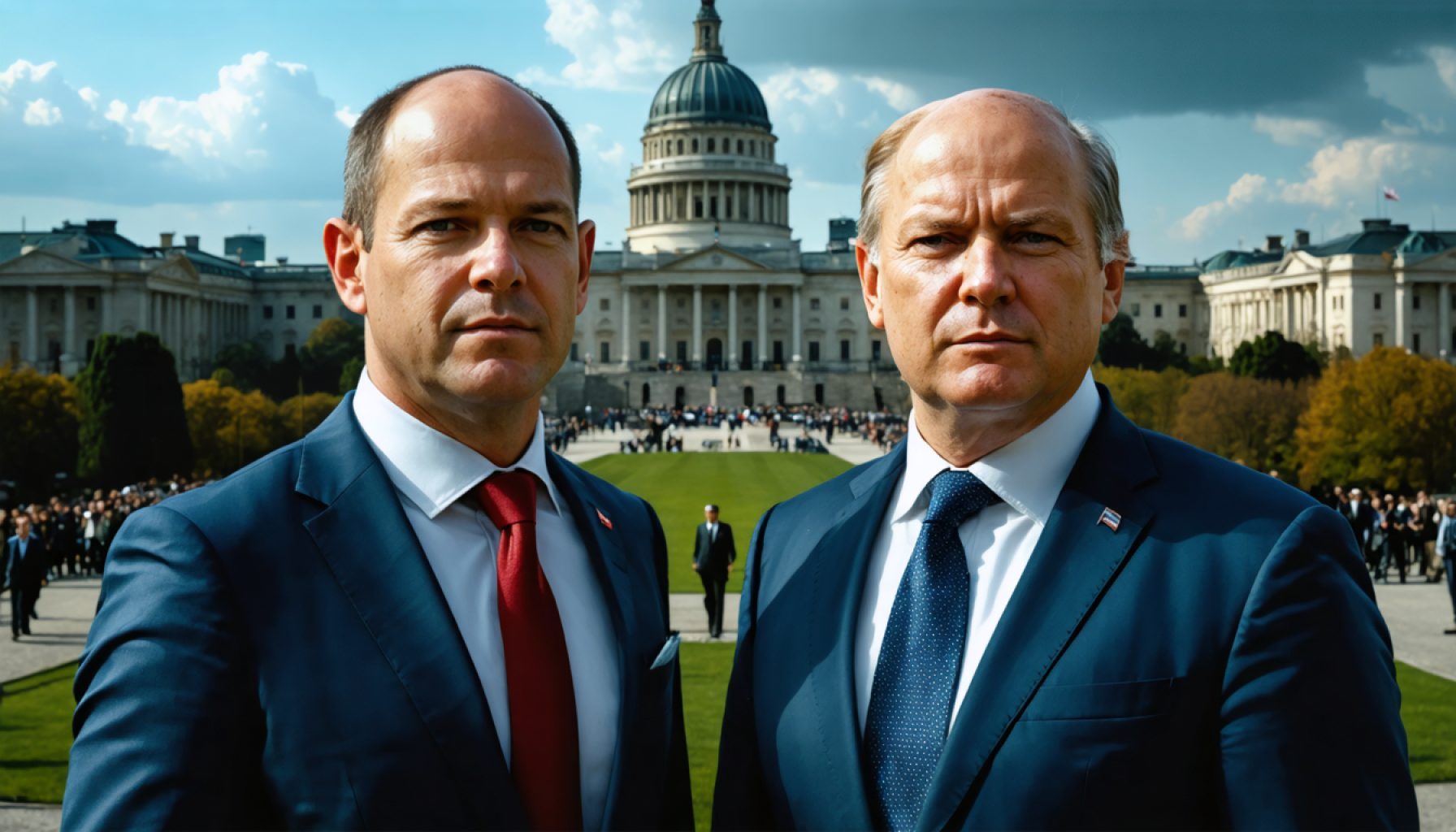- The Union places its faith in Friedrich Merz, noted for his impatience and return to prominence after a period of sidelining.
- The Social Democrats ultimately back incumbent Olaf Scholz, who shows unexpected vigor and sharpness in his campaign.
- Mathis Feldhoff and Andreas Huppert’s film documents the transformation of Merz and Scholz as they navigate the political landscape.
- Scholz aims to overcome a fragile coalition legacy, while Merz seeks to project a composed, statesmanlike image.
- The election scenario is framed by narratives of hope, ambition, and resilience, poised to redefine political destinies.
- The critical question remains whether Merz will maintain his lead or if Scholz can sway public opinion by the February 23rd election.
Under Germany’s clouded political skies, the autumn breeze of 2024 ushered in more than falling leaves. The Union boldly placed their hopes on Friedrich Merz, a figure known for his fervent impatience. Yet, deep within the Socialist horizon, Olaf Scholz’s candidacy met with whispers of discontent. The Social Democrats flirted with the allure of Boris Pistorius before settling on Scholz, who’s now brandishing an unexpected vigor on the campaign trail.
Through the lens of “Kanzler und Herausforderer – Scholz und Merz im Wahlkampf,” filmmakers Mathis Feldhoff and Andreas Huppert unravel the transformation of these contrasting figures. Scholz, previously recognized for his understated demeanor, now captivates with words as sharp as a winter gale. Meanwhile, Merz attempts to cloak his impulsive spirit with a veneer of calm, aiming for a statesmanlike presence.
Their journeys are chronicles of resilience and reinvention. Scholz carries the weight of varied ministerial roles and his tumultuous tenure as the first chancellor of a fragile coalition. Merz, once sidelined by Merkel’s political gust, made waves with an audacious return, redefining his career from corporate corridors to the cusp of CDU leadership.
As the cameras capture every misstep and victory, the film paints a vivid tapestry of modern German politics. Can Merz sustain his polling lead, or will Scholz, deemed the least popular leader, sway the nation by February 23rd?
The narratives driven by hope, ambition, and reinvention provoke a single question: Who will steer Germany through its next chapter? The nation braces for an election where profiles are reshaped, and political destinies hang by a thread.
Election Showdown in Germany: Merz vs. Scholz – Who Will Lead?
How-To Steps & Life Hacks for Understanding Political Campaigns
1. Research Candidate Histories: Delve into each candidate’s past positions and policies. Understanding Friedrich Merz’s corporate background and Olaf Scholz’s ministerial experience provides context.
2. Analyze Media Coverage: Track how different media outlets report on both Merz and Scholz. This can reveal biases and help form a balanced view.
3. Follow the Polls Carefully: While a useful indicator, polling data can fluctuate. Focus on trends over time rather than isolated results.
4. Engage in Discussions: Participate in forums or social media groups focusing on German politics to gain diverse perspectives.
5. Attend Virtual Events: Many campaign events are streamed online, providing direct insights from the candidates themselves.
Real-World Use Cases of Leadership Styles
– Crisis Management: Assess how Scholz managed challenges during his tenure, such as the financial implications of a coalition government.
– Economic Strategies: Evaluate Merz’s economic strategies rooted in his corporate experience and how they could translate to national policies.
Market Forecasts & Industry Trends in German Politics
Experts predict a more fragmented political landscape with rising influence from smaller parties like the Greens and FDP. The coalition-building post-election will significantly impact policy directions, particularly in climate and economic reforms.
Reviews & Comparisons of Candidates
– Merz: Praised for his economic acumen but criticized for lacking connection with younger voters.
– Scholz: Acknowledged for his coalition management but often seen as lacking charisma.
Controversies & Limitations
– Scholz: His tenure has been marred by the Wirecard scandal, which raises questions about oversight.
– Merz: Known for an aggressive leadership style that may alienate parts of the electorate.
Features, Specs & Pricing of Political Campaign Strategies
Merz capitalizes on his financial expertise, promising tax reforms and bureaucratic downsizing. Scholz emphasizes social policy improvements, including healthcare and worker rights.
Security & Sustainability Concerns
Both candidates emphasize energy security, though their methods differ. Scholz leans towards renewable energy investments, while Merz suggests a balanced approach including nuclear energy as a transitional source.
Insights & Predictions
Analysts predict the CDU, under Merz, may win the highest number of seats but still require coalition agreements, possibly with the FDP or Greens. Scholz’s chances hinge on revitalizing his public image and leveraging SPD’s coalition track record.
Pros & Cons Overview
– Merz Pros: Economic expertise, strong leadership image.
– Merz Cons: Perceived disconnect with youth, polarizing figure.
– Scholz Pros: Extensive governance experience, coalition-building.
– Scholz Cons: Past controversies, less charismatic.
Actionable Recommendations
– Stay Informed: Follow reliable news sources for daily updates on the election.
– Engage with Community Initiatives: Join local political discussions or events to understand grassroots opinions.
– Fact-Check Information: Utilize fact-checking websites to verify statements made by candidates.
– Register to Vote: Ensure your voter registration is current to participate in the democratic process.
For comprehensive coverage and staying updated, you can visit DW (Deutsche Welle) and Der Spiegel for trusted news on German politics.
